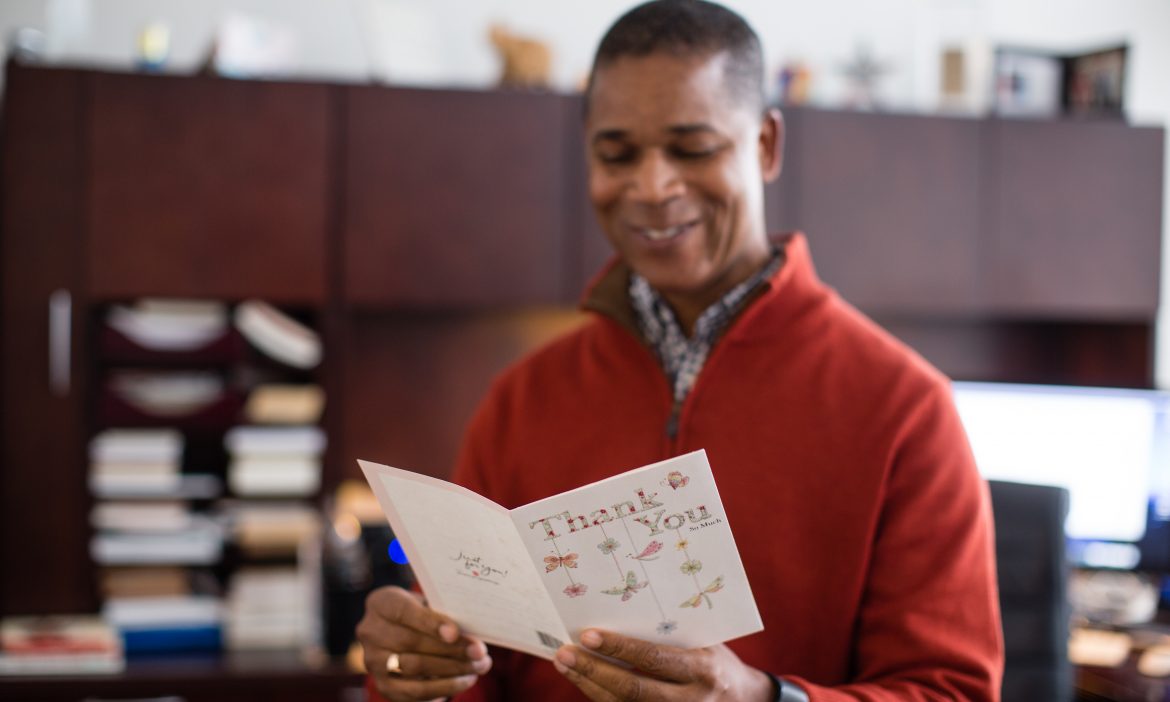Five Tennessee elementary schools came back from the holidays with a useful gift – fully stocked clinics, courtesy of donations from BlueCross and its employees.
This marks the second year of the School Clinic Drive, which began as an initiative led by two BlueCross divisions to help school nurses meet the needs of rural students in economically challenged areas. Last fall, the group collected and delivered 19 bins of medical supplies to three schools. Along with the supplies, BlueCross donated an examination table for each school and funds for the purchase of epinephrine injectors to treat allergic shock.
This year, employees at all five BlueCross offices pitched in with bandages, cotton balls and more. For 2017, BlueCross also donated funds to purchase durable medical equipment, including wheelchairs and crutches.
Getting the gear where it needed to go

Rising in what most people would consider the middle of the night, BlueCross Vice President of Clinical Engineering Rodney Woods made his way to a Chattanooga warehouse to load boxes of bandages, cotton balls, respirator masks, over-the-counter medicines and more into a van. Adding crutches and a wheelchair – and, if requested by the school, a cot – he hit the road.
Rodney repeated this process several times as he crisscrossed Tennessee during a week in late 2017 to deliver the donated medical supplies and equipment. The visits were spread over three days:
- Day 1: York Elementary and Wartburg Central Elementary west of Knoxville
- Day 2: E.A. Harrold Elementary and Westhaven Elementary in the Memphis area
- Day 3: Roan Creek Elementary in northeast Tennessee
“It meant a lot to be able to see the schools firsthand,” says Rodney, who delivered to 2016’s schools and took the lead on making 2017’s deliveries.
“We know this makes a difference – for many of these students, the school nurse offers the only health care they will receive.”
A few days after Rodney completed his last delivery, a card from one of the schools arrived at BlueCross headquarters on Chattanooga’s Cameron Hill.

“We truly appreciate the items you donated to E.A. Harrold Elementary. Thank you so much for your generosity. Merry Christmas and Happy New Year from faculty, staff, students and Nurse Susan Blevins.”
Health means better chances for success
BlueCross Chief Medical Officer Andrea Willis, M.D., shared her thoughts on the company’s efforts to meet the needs of the schools.
“It’s about providing peace of mind through better health,” she says. “It’s about giving to those in need. We would want someone to help our children if they were in need. These are our children.”
Health is a key component of success – a fact that the company readily recognizes and supports.“Before a student can learn, basic needs have to be met,” Dr. Willis says. “They cannot function well if they are sick.”

The schools are more than grateful for the help.
“We want our students to continue to grow and learn, and in-school health services are one of the best ways we can evaluate, protect and promote the well-being of our students,” says Coordinated School Health Executive Director Lori Paisley, who helped identify the schools that could benefit most from the donations. “We are grateful for the support of BlueCross in this work. These donations will allow our schools to further support student wellness and success in some of our highest-need communities.”
The impact has been greater than BlueCross ever imagined.
“Not only does this drive provide resources to address both acute and minor ailments, it allows the schools to use the sometimes scarce resources they have on true educational needs,” Dr. Willis says. “It allows these nurses to focus on the kids without worrying where the next bandage will come from.”


 Alison has been a member of the BlueCross BlueShield of Tennessee corporate communications team since 2015. A Chattanooga native, she has a decade of health care communications experience including writing, editing, public relations and social media.
Alison has been a member of the BlueCross BlueShield of Tennessee corporate communications team since 2015. A Chattanooga native, she has a decade of health care communications experience including writing, editing, public relations and social media.